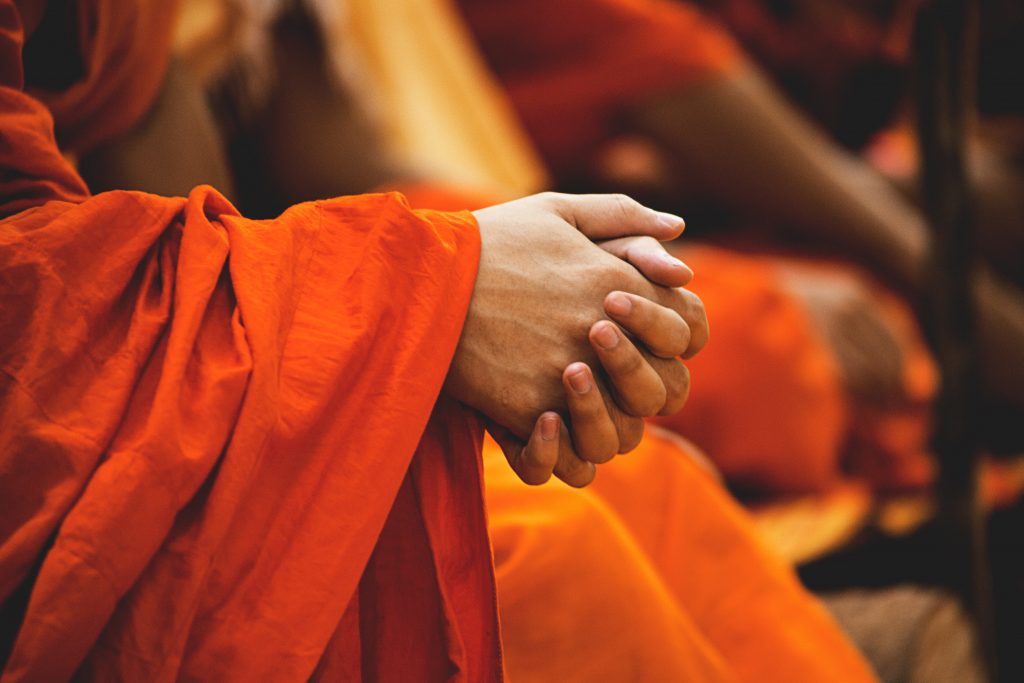We all want to be happy. It’s part of being human. No one wants to be miserable. We throw ourselves into all sorts of things to avoid it and pursue happiness instead. Sometimes we get caught up in striving, weighing ourselves down with things; a faster car, the next rung on the professional ladder, a bigger house, the latest must have gadget….the list goes on, only to find that when we get ‘there’ it isn’t enough. Happiness, is more than the sum total of our material worth or our job title. It’s about how we feel on the inside and how we make others feel. When you’re looking for the secret to a fulfilling life, where better to start than what you can learn about happiness from a Buddhist Monk? We take a look at lessons on happiness from Zen Master, Thich Nhat Hanh.
One of favourite Zen Masters, credited as ‘The Father of mindfulness’, Thich Nhat Hanh has a lot to say on happiness. This inspirational Vietnamese monk has been teaching and writing about mindfulness for the last 50 years. In fact, his ‘The Miracle of Mindfulness’ was my introduction to meditation. Each page opening up an entire world to me, a non Buddhist and the first book I seriously read on meditation and the Dharma. One thing Thich Nhat Hanh is known for is his deceptive simplicity and inspirational writing on happiness. Here’s our top 5 picks of …
What you can learn about happiness from a Buddhist Monk 1: Happiness is based on inner peace.
“Many people think excitement is happiness. But when you are excited you are not peaceful. True happiness is based on peace.”
We don’t need to go somewhere or to do something to be happy. If we’re constantly searching for happiness, we’ll probably miss it whilst we’re busy doing, doing, doing. We can achieve happiness by setting aside time each day to develop present moment awareness. Happiness is here, already, inside us not some external excalibur that we need to seek out.
What you can learn about happiness from a Buddhist Monk 2: Live in the now
“The seed of suffering in you may be strong, but don’t wait until you have no more suffering before allowing yourself to be happy.”
When we’re constantly telling ourselves that we’ll be happy when we get the new job, when we find a partner, when we lose weight, when we…. we’re on the wrong track. If we wait for happiness to arrive at some mythical point in the future when everything is just right, we’ll miss the opportunity to be happy in the present moment. Whatever our circumstances happiness is a choice that we make rather than a state that we find ourselves in. It’s always accessible, right here, right now.
What you can learn about happiness from a Buddhist Monk 3: Stop the Mental Churn
“The best way to take care of the future is to take care of the present moment.”
When we’re constantly caught up in doing mode, thinking about the future or ruminating on the past we’re feeding into the constant striving that causes unhappiness. Learn to pause and savour each moment, focusing upon what you are doing as you do it, developing your present moment awareness. Practicing mindfulness will make you more aware of when you drift off into default busy planning mode and help to you to bring your attention back to the present moment.
What you can learn about happiness from a Buddhist Monk 4: Let Go
“Letting go gives us freedom, and freedom is the only condition for happiness. If, in our heart, we still cling to anything – anger, anxiety, or possessions – we cannot be free.”
If there is somethng that you’ve been holding onto, whether it’s anger at someone or feeling mistreated or let down in some way, let it go. Recognise that when we hold onto our hurt we only damage ourselves. Learn to forgive others for their actions. Let go of anything that you’re hanging onto, all those things that are no longer useful or are harmful to you. This might mean digging deep, but it’s possible. Thich Nhat Hanh advises us to find the courage to let them go. This doesn’t mean that you should remain in harmful or abusive situations and relationships. When you find yourself in those situations wish that person, love, light and whatever else you feel thay need as you remove yourself. Exercise self compassion and set an intention to move on and begin your journey to a happier life.
What you can learn about happiness from a Buddhist Monk 5: Practice Mindfulness
“Every one of us already has the seed of mindfulness. The practice is to cultivate it.”
Thich Nhat Hanh describes the mind as a garden. How we cultivate the seeds in that garden has an impact upon our happiness. This means being aware of habitual negative thought patterns or habits. Bring awareness to what you do and how you do it every day. Who are you surrounding yourself with? What are you listening to or reading? Think of it as gardening for your mind, you only want the good stuff going in so prune the negativity away. Limit toxic relationships along with dialling down negative influences that you are exposed to. Savour the good, develop a growth mindset and seek out positive experiences instead. Practicing mindfulness on a regular basis is a great way of making sure that you water the flowers of happiness. As little as 10 minutes a day will make a difference to your wellbeing, mental health and overall happiness. Take a look at our Free Guide to Mindfulness free Guide to Mindfulness to find out more.
If you’d like to know more about happiness or our mindfulness training courses get in touch. We work internationally with Fortune 500 companies offering mindfulness at work courses, mindful leadership courses, executive coaching and mindful coaching sessions.
Originally published at www.korudevelopment.co.uk


